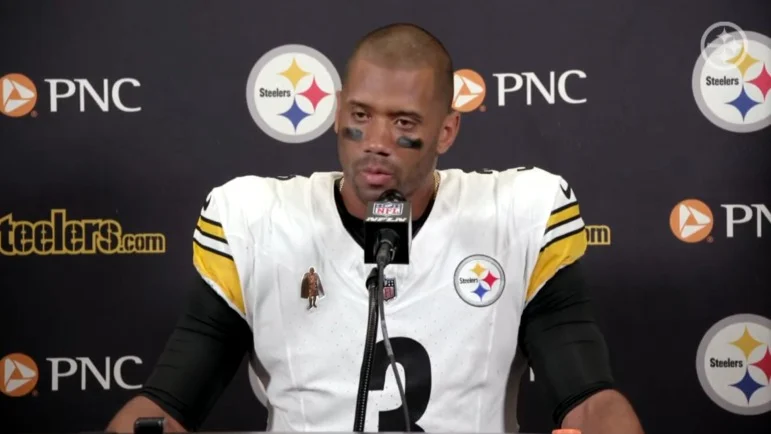Russell Wilson’s Jaw-Dropping Announcement Sends Shockwaves Through the NFL—What It Means for Steelers Head Coach Mike Tomlin and…

In a stunning development, Pittsburgh Steelers quarterback Russell Wilson has announced his immediate retirement from professional football, a decision that has sent shockwaves throughout the NFL. This unexpected move comes on the heels of a season marked by a heated quarterback competition between Wilson and Justin Fields, leaving the Steelers’ leadership, particularly Head Coach Mike Tomlin, facing significant challenges as they prepare for the upcoming season.
Wilson, a seasoned veteran, joined the Steelers with high expectations. However, an early-season injury sidelined him, providing an opportunity for the younger Justin Fields to step into the starting role. Fields capitalized on this chance, leading the team to a 4-2 record during Wilson’s absence. Upon Wilson’s return, he reclaimed the starting position, guiding the Steelers to a 6-1 run in his first seven games back. Despite this strong performance, the team experienced a late-season slump, culminating in four consecutive losses, a 10-7 overall record, and an early exit in the Wild Card Round of the playoffs.
The internal debate over the starting quarterback role intensified as the season progressed. Owner Art Rooney II confirmed that the organization faced a pivotal decision, ultimately opting to retain only one quarterback. Despite differing opinions within the franchise, Wilson was favored over Fields, a choice that underscored the complexities of balancing veteran experience with emerging talent.
Wilson’s retirement not only upends the Steelers’ immediate plans but also significantly impacts the broader NFL landscape. His departure elevates Justin Fields to the starting quarterback position, providing the young player with an opportunity to establish himself as the team’s leader. This transition places Head Coach Mike Tomlin in a critical position, as he must now adapt the team’s strategy to align with Fields’ playing style and address any potential gaps in experience.
The timing of Wilson’s announcement coincides with a dynamic period in the NFL’s quarterback market. The 2025 free agency is notable for its focus on quarterbacks, especially given a relatively thin draft class. Several former starters are available, including Sam Darnold, who is ranked as the top choice after an impressive season with the Minnesota Vikings. Wilson’s retirement adds another layer to this landscape, as teams reassess their options in light of his sudden departure.
For the Steelers, the immediate priority is to solidify their quarterback lineup. With Fields now positioned as the presumptive starter, the team must evaluate backup options and consider potential acquisitions to ensure depth and stability at the position. Coach Tomlin’s leadership will be pivotal during this transition, as he works to maintain team morale and cohesion amidst the unexpected change.
In conclusion, Russell Wilson’s unforeseen retirement has introduced a significant shift within the Pittsburgh Steelers organization and the NFL at large. As the team navigates this transition, the focus will be on supporting Justin Fields in his new role and adjusting strategies to maintain competitiveness in the upcoming season. The ripple effects of Wilson’s decision will undoubtedly influence team dynamics, player transactions, and coaching strategies across the league.
